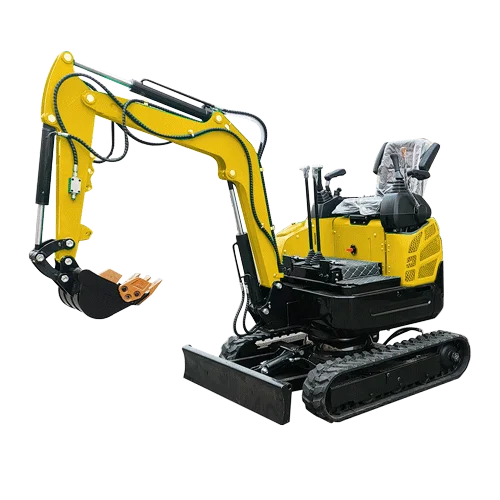Welcome to My Blog!
Before we dive into the content, I’d love for you to join me on my social media platforms where I share more insights, engage with the community, and post updates. Here’s how you can connect with me:
Facebook:https://www.facebook.com/profile.php?id=100087112105480
LinkedIn:https://www.linkedin.com/showcase/99327366/admin/dashboard/
Now, let’s get started on our journey together. I hope you find the content here insightful, engaging, and valuable.
Introduction

In the realm of construction and excavation, the choice of equipment can significantly impact project efficiency and cost-effectiveness. A small size excavator is increasingly becoming the go-to machine for various applications, ranging from landscaping to small-scale construction projects. This blog will delve into the numerous benefits of using a small excavator, exploring its features, applications, and how it can enhance project outcomes. Understanding the advantages of this equipment will help contractors and DIY enthusiasts make informed decisions that lead to successful project completions.
What is a Small Size Excavator?
Definition and Characteristics
A small size excavator typically refers to machines weighing between 1.5 to 6 tons (approximately 3,300 to 13,200 pounds). These compact machines are designed for various excavation tasks, combining agility with robust performance. Key characteristics of small excavators include:
- Compact Design: Easily maneuverable in tight spaces.
- Operating Weight: Usually ranges from 1.5 to 6 tons.
- Versatile Attachments: Compatible with various tools for different tasks.
- Powerful Hydraulic Systems: Designed to handle digging, lifting, and moving materials efficiently.
Common Specifications
| Specification | Typical Value |
|---|---|
| Operating Weight | 1.5 to 6 tons |
| Engine Power | 15 to 50 horsepower |
| Digging Depth | 1.5 to 3 meters (5 to 10 feet) |
| Bucket Capacity | 0.05 to 0.2 cubic meters |
| Ground Pressure | Low ground pressure for soft surfaces |
Advantages of Using a Small Size Excavator
Cost-Effectiveness
One of the most significant benefits of a small size excavator is its cost-effectiveness. The initial purchase or rental cost is generally lower than that of larger excavators. Additionally, their fuel efficiency leads to reduced operating costs, allowing projects to stay within budget.
Enhanced Maneuverability
Small excavators are designed for maneuverability. Their compact dimensions allow them to operate in confined spaces where larger machines cannot, such as residential backyards or narrow streets. This feature is particularly beneficial for urban construction projects.
Versatility of Applications
Small size excavators are incredibly versatile and can perform a wide range of tasks, including:
- Excavation: Digging trenches for utilities or foundations.
- Landscaping: Moving soil, grading, and preparing sites for planting.
- Material Handling: Loading and unloading materials efficiently.
- Demolition: Small-scale demolition tasks in residential or commercial sites.
Reduced Labor Costs
By utilizing a small size excavator, contractors can significantly reduce labor costs. These machines can perform tasks that would typically require multiple workers, thus streamlining operations and increasing productivity on the job site.
Environmentally Friendly
Small size excavators generally have lower emissions compared to their larger counterparts. Their fuel-efficient engines contribute to reduced environmental impact, making them a more sustainable choice for projects that prioritize eco-friendliness.
Easy Operation
Modern small excavators come equipped with user-friendly controls, making them accessible to operators with varying skill levels. This ease of operation reduces the need for extensive training, allowing projects to progress smoothly and efficiently.
Safety Features
Safety is paramount in construction, and small size excavators often come equipped with safety features such as rollover protection structures (ROPS) and stability systems. Their compact design also minimizes the risk of accidents in tight workspaces, ensuring a safer job site.
Applications of Small Size Excavators
Small size excavators are utilized in a multitude of sectors, each taking advantage of their unique properties. Here are some common applications:
Residential Construction
In residential projects, small excavators are used for tasks such as digging foundations, landscaping, and trenching for utilities. Their ability to navigate tight spaces makes them ideal for home improvement projects.
Landscaping and Gardening
Landscapers frequently use small size excavators for grading, soil removal, and planting. Their compact size allows them to access difficult areas, making them invaluable for creating beautiful outdoor spaces.
Utility Installation
Utility companies often employ small excavators to install underground services like water, gas, and electricity. Their capability to dig narrow trenches in urban settings makes them perfect for utility work.
Road Maintenance
In road maintenance, small excavators are used for tasks like repairing potholes, digging drainage ditches, and removing debris. Their versatility allows them to adapt to various road repair tasks.
A Comparison of Small Size Excavator Features

To illustrate the characteristics of small excavators, here’s a table summarizing their properties:
| Feature | Description |
|---|---|
| Operating Weight | 1.5 to 6 tons |
| Engine Power | 15 to 50 horsepower |
| Digging Depth | 1.5 to 3 meters (5 to 10 feet) |
| Bucket Capacity | 0.05 to 0.2 cubic meters |
| Ground Pressure | Low ground pressure for soft surfaces |
| Attachments Available | Buckets, augers, grapples, forks |
| Fuel Type | Diesel or gasoline |
| Controls | User-friendly, joystick operation |
Conclusion
Using a small size excavator in projects offers numerous advantages that enhance efficiency, reduce costs, and improve safety. Its versatility and maneuverability make it an ideal choice for various applications, from residential construction to landscaping and utility installation. By investing in or renting a small excavator, contractors and project managers can ensure successful outcomes while maintaining budgetary constraints and promoting sustainability.
FAQ
What tasks can a small size excavator perform?
Small size excavators can perform a variety of tasks, including excavation, landscaping, material handling, and small-scale demolition.
How deep can a small excavator dig?
Most small excavators can dig to depths ranging from 1.5 to 3 meters (5 to 10 feet), depending on the model and configuration.
Is it easy to operate a small size excavator?
Yes, modern small size excavators are designed with user-friendly controls, making them accessible for operators with varying levels of experience.
What are the typical rental costs for a small size excavator?
Rental costs can vary based on location and duration, but they generally range from $100 to $300 per day.
Are small size excavators environmentally friendly?
Yes, small size excavators typically have lower emissions and fuel consumption compared to larger machinery, making them a more sustainable choice.
